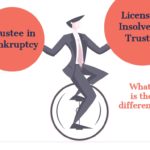

Debt consolidation vs. consolidation loan
By Marc Nantel-Legault
A consolidation loan is a type of debt consolidation. However, there are several other ways to consolidate your debts. In this article, we will give you more information so that you can see things more clearly.
The purpose of debt consolidation
This solution usually takes the form of a consolidation loan which aims to consolidate several debts into one. The objective of a consolidation is to have a single monthly payment to repay all of your debts and to reduce the cost of interest. This should help you improve your financial situation faster.
The debt consolidation loan can be secured by assets, such as a residence, or not. Some lenders will require the borrower to have an endorser or co-borrower to reduce their risk in the event the borrower fails to meet its obligations.
The different types of consolidation loans
Several types of loans to consolidate your debts are available on the Internet, including the following:
- the unsecured debt consolidation loan granted by a financial institution;
- the debt consolidation loan secured by a 2nd mortgage on your home;
- a mortgage refinancing that would allow you to pay off several debts by increasing the balance of your first mortgage.
An interesting solution for you?
First, note that an unsecured debt consolidation loan is a term loan and not a revolving credit facility. Thus, the loan balance decreases with all payment periods until it reaches $0. You must therefore make sure you have access to an emergency fund to deal with the unexpected expenses before opting for this solution.
“The consolidation loan is interesting for a person who has identified the cause of his indebtedness and who has the financial capacity and a stable income. It is critical that the person respects his monthly payment obligations”, explains Marc Nantel-Legault, licensed insolvency trustee. “In addition, the credit file must be good enough to be able to negotiate a consolidation loan agreement `with a reasonable interest rate.”
How to perform a debt consolidation?
Before going to the financial institution to apply for a debt consolidation loan, make sure you are well prepared. Make a budget over a period of one to five years to show that your financial capacity is sufficient to allow you to meet the repayment agreement. Don’t forget to take into account irregular expenses and unforeseen expenses. In the analysis of your file, we will take into account your credit report, the stability of your income, your assets and your debt ratio.
Generally speaking, the financial institution that you owe the most money to, will be the most willing to give you an unsecured debt consolidation loan. It is also likely that it will only agree to consolidate the debts you owe to this bank as part of a debt consolidation loan. In this scenario, this option might not solve your debt problem.
On the other hand, if your debt is spread among several lenders, it will be practically impossible for you to obtain this type of loan if you do not pledge assets as collateral or if you do not have an endorser.
Avoid a deterioration of your financial situation
If you are offered a loan to consolidate your unsecured debt over a term of more than five years, at an interest rate above 14%, it would be wise to examine the offer in detail with an independent financial adviser before accepting it. In the same vein, before accepting a consolidation loan secured by your home, it would be to your advantage to consult a mortgage broker, a notary or a licensed insolvency trustee to find out all the repercussions and obtain sound advice. Make sure that the debt consolidation loan will not be a step towards a deterioration of your financial health.
What if the consolidation loan application is refused?
“We invite people who have been refused consolidation by a financial institution to consult us in order to assess their financial situation,” replies trustee Marc Nantel-Legault. “We will discuss the other options available to them. Among other things, we will be able to assess the possibility of filing a consumer proposal. » The first consultation is free and confidential, without obligation on your part and without initial costs. Enjoy!






